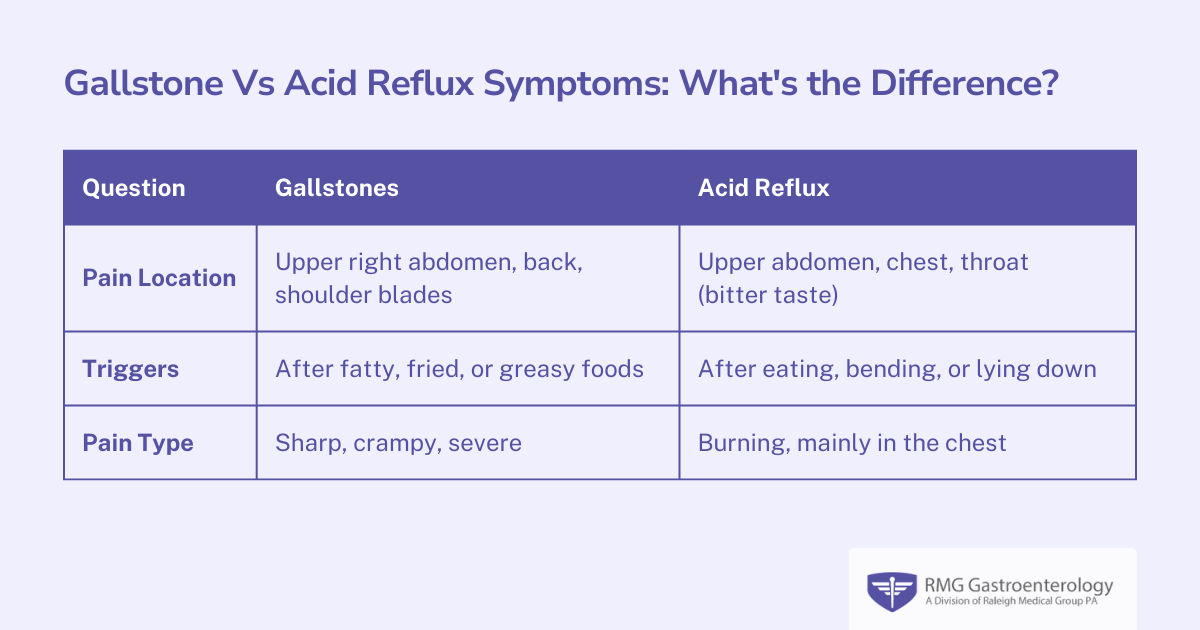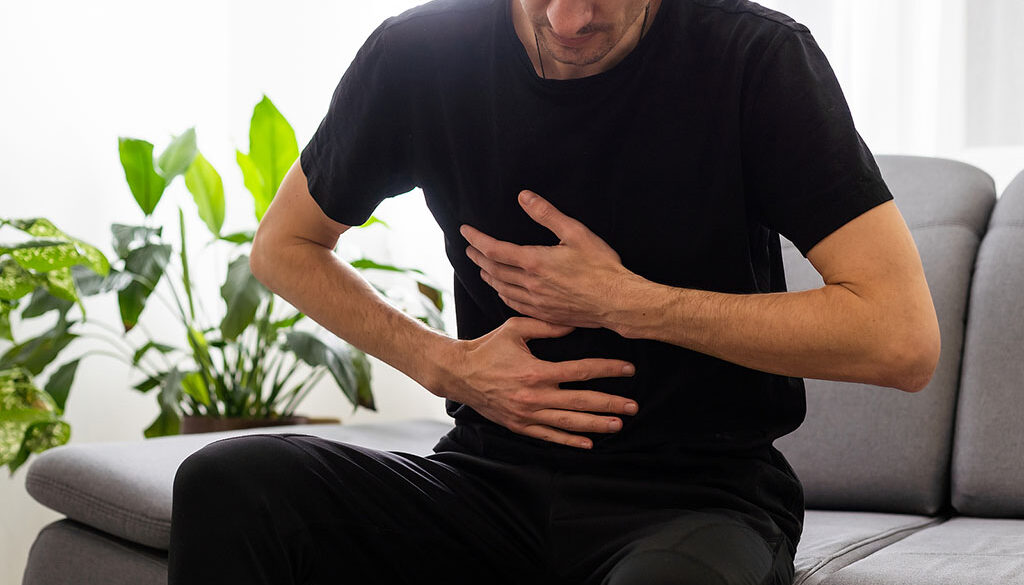Can Gallstones Cause Acid Reflux? Know When To See A Doctor
As the pain creeps into your stomach and chest, you carefully review your menu of the day. Did you eat something that could have caused intense heartburn? When that yields no answers, it may not be clear where to turn. Did you realize this could be more than a mere stomach issue?
Can gallstones, cause acid reflux? While gallstones and GERD may seem to be unrelated, there’s actually a connection that makes a big difference in determining the right treatment.
At RMG Gastroenterology, we know that acid reflux is more than just heartburn. It can not only transform your life but could be an indicator of GERD—a severe condition that can lead to complications if left untreated. In addition, we understand the relationship between gallstones and acid reflux, which is vital when we tailor a care plan for you.
In this article, we’ll explore the relationship between gallstones and acid reflux and examine the difference between their symptoms.
Can Gallstones Cause Heartburn? The “Hidden” Relationship
First, a brief refresher: Gallstones are hardened elements of cholesterol, bilirubin and bile. They can be as large as a golf ball or as small as a grain of sand, often causing upper abdominal pain, bloating and nausea.
But can gallstones cause heartburn?
The answer isn’t necessarily a direct cause-and-effect relationship. However, there are many ways that gallstones can contribute to the pain and discomfort of acid reflux and GERD.
Inflammation of the Gallbladder Associated with Gallstones
Sometimes gallstones are associated with inflammation of the gallbladder which is in the vicinity of the stomach. When there is inflammation of the gallbladder related to gallstones, the stomach could be involved causing increased acid in the stomach and thus increase the risk of acid reflux and GERD.
Stomach Pressure
Bloating is one of the symptoms of gallstones, and when this increases pressure on your stomach, you could develop acid reflux.
What’s the Difference Between Gallstone and Acid Reflux Symptoms?
Since both gallstones and acid reflux can cause painful heartburn, how can you tell them apart? The key is within the subtleties of the symptoms you’re experiencing. To help us determine the source of your pain, ask yourself the following questions:
Where Is My Pain Located?
While both acid reflux and gallstone pain can be felt in the upper right abdomen, discomfort from gallstones can radiate to your back and shoulder blades. By contrast, acid reflux can also cause pain in your mouth or throat. You may even notice a bitter taste. This is because your stomach acid is backing up into your esophagus.
Did The Pain Occur After Eating?
Both can present pain after eating, although pain from gallstones typically occurs after you’ve eaten fatty, fried or greasy foods. In addition, remember that heartburn often gets worse if you bend forward or lie flat on your back.
How Would I Describe This Pain?
Typically, gallstone pain is sharp and crampy. It can be severe, and in certain cases, may require a visit to an emergency room, particularly if there is an infection. Acid reflux is more like a burning sensation that feels more intense in your chest. By comparison, gallstone pain can be felt in other parts of your body.

When Should I See a Doctor About Gallstone Pain?
We encourage you to schedule an appointment any time you have symptoms that bother you. Typical gallstone symptoms include:
- Sudden pain in your upper right abdomen
- Back pain, particularly between your shoulder blades
- Nausea
- Vomiting
We also want to be very clear: There are times when you should seek immediate care for your symptoms. Severe pain can indicate a more serious problem that requires emergency treatment.
Go to the nearest emergency room if you are experiencing:
- Intense abdominal pain that makes it difficult to sit still
- Jaundice, which is a yellowing of your skin and the whites of your eyes
- A high fever
- Chills
How Will You Treat My Gallstones?
We can diagnose and treat gallstones through our state-of-the-art compassionate care. Our approach depends upon many factors, including the severity of your condition, the size of your gallstones, and whether or not you have an infected gallbladder.
If your gallstones are small, medication can help dissolve cholesterol stones. However, if you have recurrent gallbladder attacks, the most effective treatment is to remove your gallbladder. This means your gallbladder can be removed using small instruments that are inserted through small incisions, as compared to an “open” surgery that would require a larger incision.
Let Our Experienced Gastroenterologists in Raleigh Relieve Your Gallstone Pain
Acid reflux is much more than a mere inconvenience. It can lead to more serious conditions, and when acid reflux is caused by gallstones, it’s crucial to get the timely treatment you deserve to alleviate your pain.
At RMG Gastroenterology, we’ve implemented the best practices based upon the latest research to create our Centers of Excellence. From our Center for Advanced GI Therapeutics to our Center for Liver Diseases, we invite you to experience our dedication to compassionate care.
If you have any of the symptoms listed above, or if you’re having problems with chronic heartburn, contact us to schedule an appointment today.
The content within this article and others on this website is only for educational purposes and should not be considered medical advice. For any questions or concerns, please consult with your healthcare provider.


